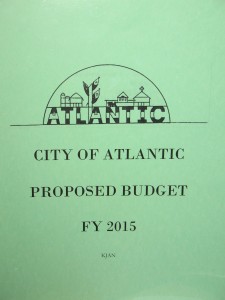The Atlantic City Council, Wednesday, will hold the first of two work sessions on the Fiscal Year 2015 Budget. The first session will come on the heels of Wednesday’s regular council meeting, which takes place at the Atlantic Senior Center, beginning at 5:30-p.m. The next budget work session will be held Feb. 11th. The Council is slated to adopt the preliminary budget during their meeting on Feb. 19th, and hold a Public Hearing prior to adoption of the Budget during their regular session, on March 12th.
In a nearly one-inch thick FY 2015 Budget Report, City Administrator Doug Harris said the proposed budgets for all operating funds amounts to $9.373-million, which is a decrease of $481,863 or 4.9%, from the total estimated expenditures in FY 2014. Even though the budget is lower than last year, the tax rate for the City is going up. Harris said the rate would be $18 per $1,000 of assessed taxable value, which is an increase of 32-cents or 1.8%, over the last Fiscal Year. Of the six tax-levying funds available to the City, only two are responsible for the increase in taxes: The Employee Benefit Fund (EBF) and Debt Service Fund (DSF).
Harris says the EBF is up 18-cents per thousand, or 4.36%, while the DSF is up nearly 14-cents per thousand, or 2.9%. The biggest dollar increase in the EBF is for Health Insurance Premiums, which Harris says are up 14.9%. Fewer Workers Compensation claims have brought the City a $4,00 savings, and brought all other non-health insurance costs down to a net increase of just one-half percent.In increase in the DSF according to Harris, reflects a change in accounting for equipment purchases, the expenses for which were double-counted under the old system when debt payments and capital expenses for capital equipment purchases were charged to the fund. The current Capital Improvement Plan (CIP) does not call for issuing any more general obligation bonds in 2014.
The largest tax levy fund is capped by the State at 8.1-mils, or $8.10 per $1,000 taxable value. Property tax assessment legislation passed by the State last year will continue to contribute upward pressure on property tax rates, according to Harris, and the resulting gradual shift of the tax burden onto residential tax payers.
The new legislation rolls back the assessed values of commercial and industrial properties, and reclassifies multiplex apartment buildings from commercial to residential. The change in assessment practices, Harris says, will constrict tax revenue in the City’s General Operating Fund, and increase taxes on residential tax payers for the five other funds supported by property taxes.






